
archives for 06/2018
Opening a concrete bag with scissors helps to prevent the bag from ripping.
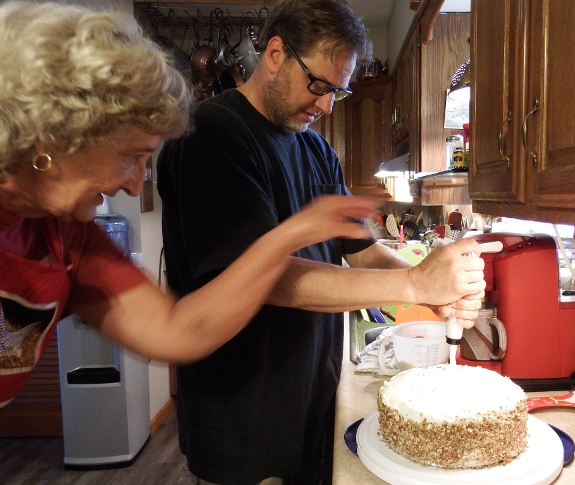
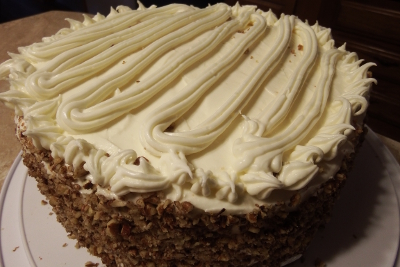 Mark's
first attempt at cake decorating came out very well. If he was going to
do it over, though, he says he would have filled the icing bag all the
way for optimal control.
Mark's
first attempt at cake decorating came out very well. If he was going to
do it over, though, he says he would have filled the icing bag all the
way for optimal control.
The EZ privacy bed curtain is a good
way of creating a room within a room.
I had to cut a few of the
pipes to make it fit in our low ceiling mobile home but installation is
easy and only took about 30 minutes. No impact on the walls or ceiling
due to the way the pipes expand to snug up against the floor and
ceiling.
It blocks most of the light
and helps Anna to sleep in a little past the crack of dawn.
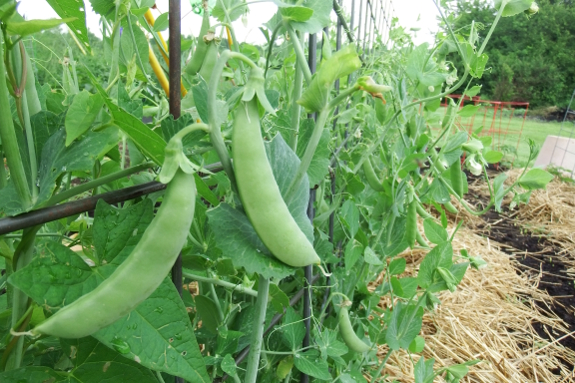
We woke up Friday
morning to rain on the forecast and all of my writing work done by 10
am. "Let's go to visit Mom," Mark suggested. I was glad to agree
because I knew my mothers-in-law would have stocked up on ways to spoil
me.
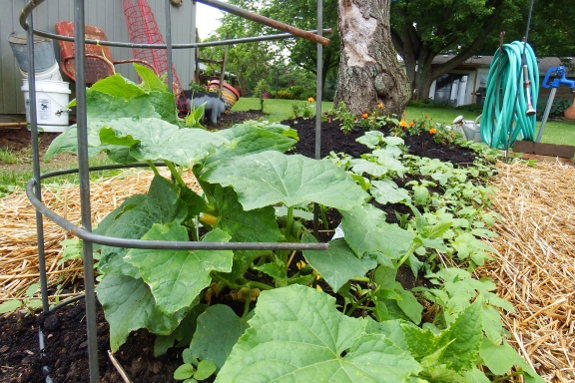
What's the key to my
heart? Lots of chocolate...and getting to play in mushroom compost all
afternoon. Last time we visited, a truckload of the latter had recently
been delivered, and I
got to spread some in their garden patch. The manure-rich soil
amendment was dark enough to make me jealous, far better than any
purchased compost we'd ever bought.
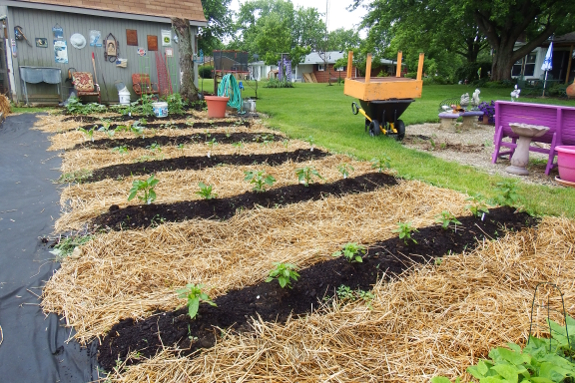
Of course the proof is
in the pudding --- how do vegetables look several weeks later planted
in that mushroom compost? The answer --- beautiful and healthy! No
wonder I got so much joy out of spreading the rest of the pile in
another garden spot Friday afternoon.
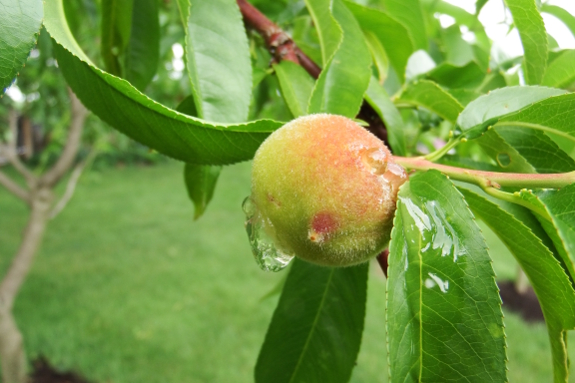
I also dropped by the peach trees
I'd adopted and
thinned out touching fruits. There was quite a lot of insect damage,
plainly visible from the gummy secretions the plants create where the
bugs have bored inside. I tried to pick off damaged fruits if at all
possible, but ended up leaving some so as not to denude the tree.
It's your peaches' turn
next, Lynda. Let me know if you want me to thin your crop!
We used small corner brackets
to hold in place our brace post.
The next step was to hammer
in a 10 inch nail to secure the two pieces.
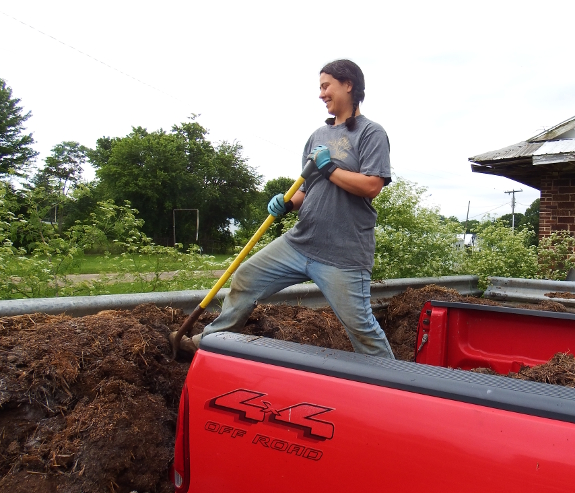
Oh, glorious horse
manure! Free for the shoveling at the fairgrounds, we stocked up on a
truckload of moderately aged (but still hot) organic matter.
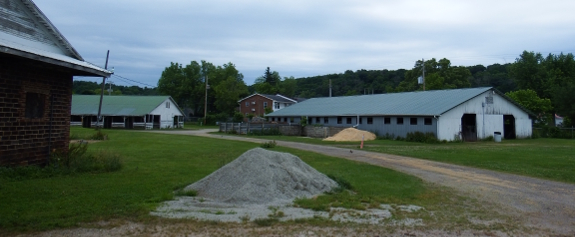
Like most stables
nowadays, the fairgrounds beds with sawdust (back pile) rather than
with straw. And even though that means the combo composts a little
slower, I have a feeling we'll be happy with the results.
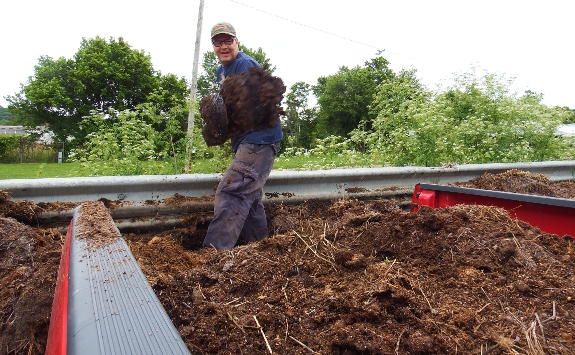
Mark's already happy
with the way the pile has been pushed back against a wall so you can
stand on the pile or the tailgate and shovel horizontally rather than
tossing it up into the truck bed. We filled up the truck in half an
hour and I'd used every bit of the organic matter by 1:30 pm. More on
garden applications in a later post.
We decided to upgrade to a
Stihl MS 181 with the Easy2Start feature.
There is a lot of large trees
that were cut down to make room for the mobile home and power line and
the plan is to build a wood shed and start cutting it into firewood.
The Easy2Start feature has a
little learning curve but once you figure it out it is actually easy.
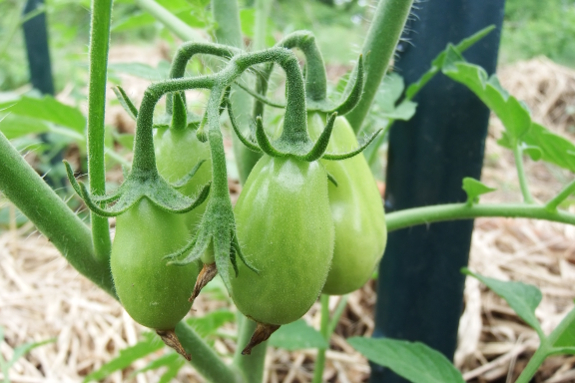
How do you use up an entire
truckload of partially composted manure in a couple of hours? Start
out by topdressing --- applying bands of compost just far enough away
from plants so the high-nitrogen effluent won't burn the roots.
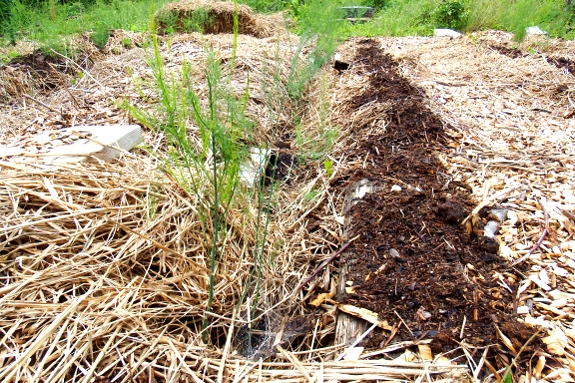
I put the manure on top
of mulch near sensitive plants like asparagus and underneath the mulch
near hungry plants like tomatoes. On top of mulch is safer but slower
since manure juices will take a while to leach through the straw and
into the soil. Be sure to stay at least three to four inches away from
plant stems either way.
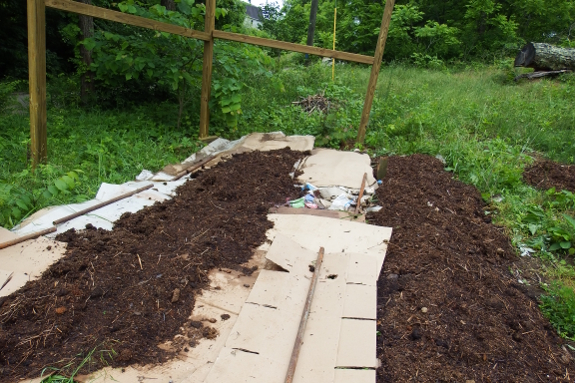
Next, I spread an inch
or two of manure onto each fallow garden bed (on the right in the photo
above). Worms and cats will mix the manure in, resulting in rich, ready
soil in about a month. Similarly, the entirely new bed I created (on
the left in the photo above) will be ready to plant into by early to
mid July.
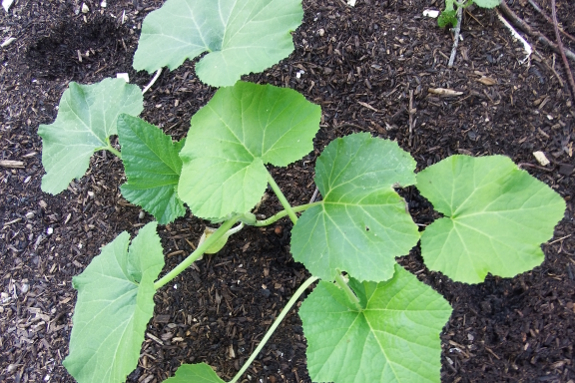
The only real question
left is --- can I have a little more please?
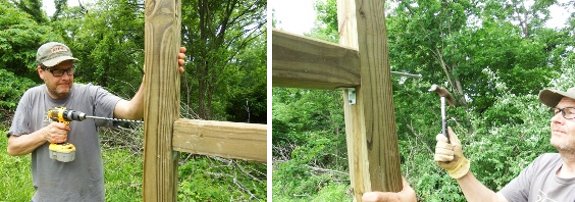
The second part of securing
our brace posts was to drive a 10 inch nail in after drilling a hole
the full length of the nail.
We decided that one nail was
enough for each side of the brace.

If you're in the Athens, Ohio, area before the end of September and
want a treat, I highly recommend dropping by the Kennedy Museum of Art.
Admission is free, and the current exhibit of Haitian art is not to be
missed.
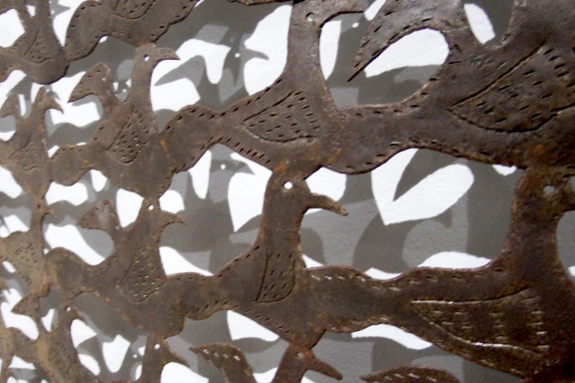
Mom came to visit for a few days, and we spent our first morning in the
exhibit formally titled "A Sudden Garden." I think we all ended up
walking out of that space feeling like we really had strolled through a
peaceful and at the same time inspiring garden deep in the heart of
Haiti.


We each picked a painting that we could have liked to take home. Mine
is the first one in this post, while Mark preferred this village scene
--- so much more intricate and fascinating up close!
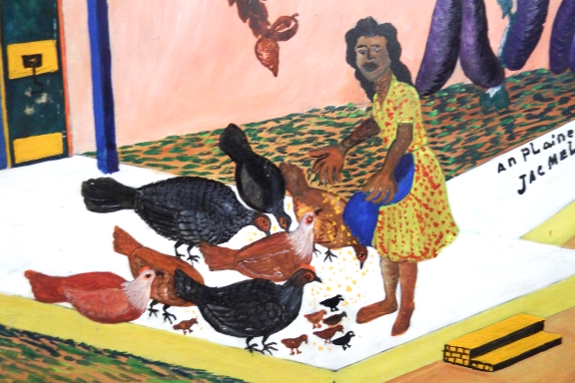
Oh, and to make this post vaguely homesteading-related, here are some
Haitian fowl to round it all out.
We thought about mixing our
concrete up in a wheelbarrow but the bag says you can just pour it in
the hole and add water.
It worked fine without any
mixing or poking with a stick.
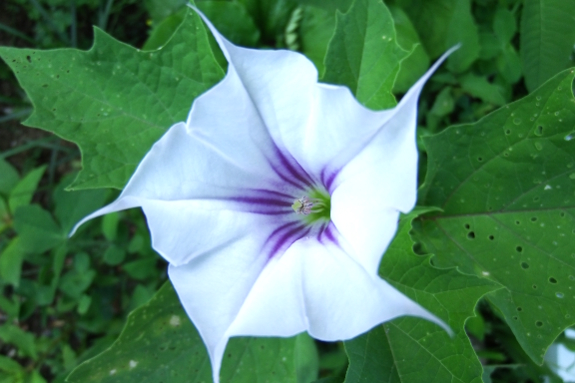
Did you know that the
common garden weed Jimsonweed was named after the Virginia settlement
of Jamestown? The name dates back to 1676 when British soldiers sent to
squash Bacon's Rebellion instead ended up enduring an eleven-day
hallucinogenic episode due to dining on Jimsonweed leaves.
I'll be pulling these
volunteers out shortly, but wanted to enjoy the evening-opening,
moth-pollinated flowers first.
We are using 8 foot long T
posts at some of the fence intervals with plans of using 1 and 1/4 inch
PVC conduit to slip over the T post to extend the length to 8 feet.
I like using ear protection when using the fence pounder.

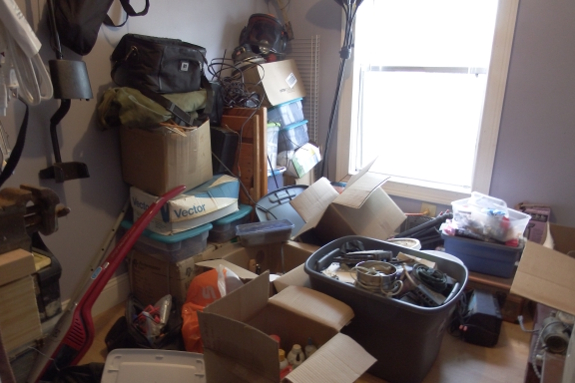 There's nothing like an
incipent visitor to prompt us to finally unpack the last jumbled pile
of untouched boxes from our move. Within a few days, Mark converted the
picture on the right to the picture at the top of this post. Then Mom
made the journey to give the guest room a purpose.
There's nothing like an
incipent visitor to prompt us to finally unpack the last jumbled pile
of untouched boxes from our move. Within a few days, Mark converted the
picture on the right to the picture at the top of this post. Then Mom
made the journey to give the guest room a purpose.
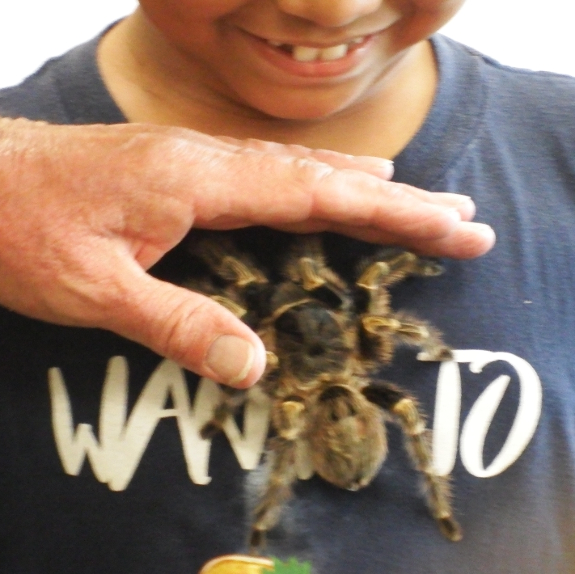
We took surprisingly few
pictures even though we had oodles of fun. One major crowd pleaser was
the insect talk turned comedy hour at the library. "You don't get out
much, do you?" the presenter tossed our way as Mom and I exploded into
gales of uncontrollable giggles.
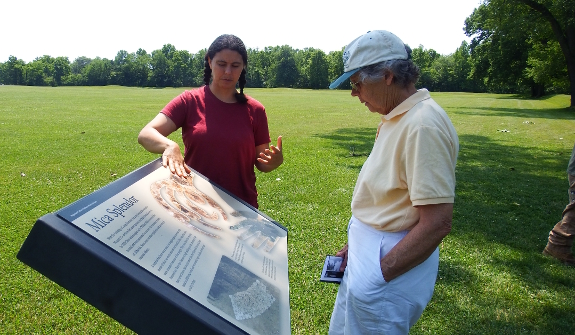
We went to the park and
the museum and the Indian mound. In fact, I ran her so hard,
she lost her shoes.
A huge thank you to
everyone who helped make this trip possible --- ferry people Maggie and
Tina and Rose Nell and Joey, hosters Sue Ella and Jayne, trip planner
Mark, bed snuggler Huckleberry, and most of all thanks to Mom for
coming so far to make my week a delight. I hope we can do it again soon!
Why were we using T posts in
some areas of our new garden fence?
To save a little money in
spots where a 4x4 might be over doing it.
We elected to use the above
ratchet device to keep the brace posts tight.
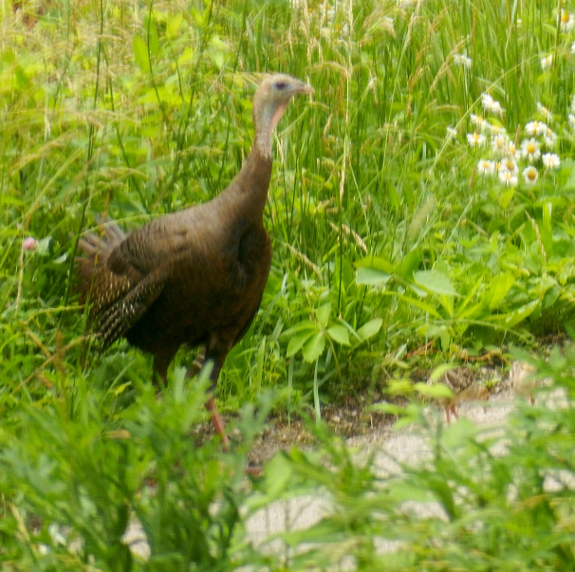
Can you see the baby
turkeys in the photo above? I took this picture at the furthest extent
of my camera's zoom, but maybe the image below will help see that the
entire family was literally strolling down the road right by our place.
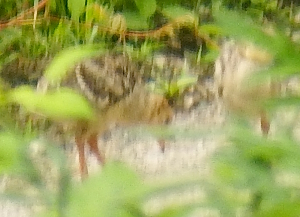 I
don't mind the turkeys, but the deer are getting voracious as we slowly
work in fence-building episodes around our various other commitments.
While I regret the repeated losses, I can now answer my
own question quite
easily. Yes, deer love asparagus and cucumbers and raspberries and
pretty much everything else imaginable. Hopefully our fall garden will
be fully fenced and fully safe.
I
don't mind the turkeys, but the deer are getting voracious as we slowly
work in fence-building episodes around our various other commitments.
While I regret the repeated losses, I can now answer my
own question quite
easily. Yes, deer love asparagus and cucumbers and raspberries and
pretty much everything else imaginable. Hopefully our fall garden will
be fully fenced and fully safe.
Each corner of our garden
fence has a brace.
The tension wire tightened by
the ratchet keeps the posts from sagging when we stretch the wire fence
on it.
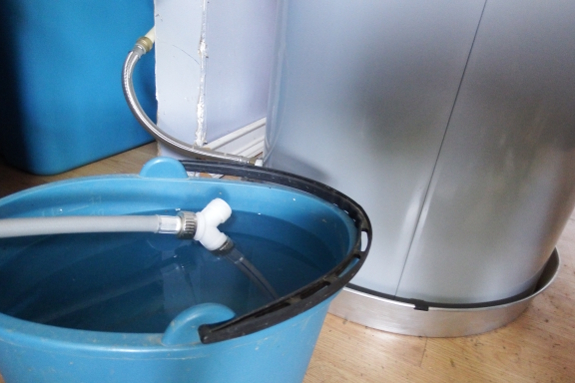
I'd been meaning to post
an update --- thanks for the reminder!
For summer use, I love
our heat-pump
water heater. It
operates as an air conditioner and dehumidifier while also heating
water using much less electricity than a traditional hot water heater.
We haven't plumbed the drain pipe to the outdoors yet, so I also end up
with about two gallons of water to use in the garden every week ---
bonus!
On the other hand, we
chose to keep the unit in electric mode over the winter so we wouldn't
chill down our living quarters. The particular brand we bought
automatically turns to heat-pump mode after 48 hours, which meant every
two days I had to push a button or end up with a cold room. So, a minor
downside...but not enough to decide against the model. (Placed in an
unused basement or close to an overachieving wood stove, you could
likely leave it in heat-pump mode all year.)
Similarly, the noise
factor might be a problem for some of you. I'd say it's as loud as a
window air conditioner, which I actually found soothed me to sleep at
night. (We generally only use hot water in the evening to do dishes and
bathe, after which the water heater runs for around two hours to
refresh itself.) For me, this was a surprising plus rather than a
minus, but your mileage may vary.
The final factor is
energy efficiency...and here I have to trust the manufacturers that the
unit is dramatically more efficient than a traditional model. Our
electric bill has been lower than expected
this summer, despite running the minisplit to cool our living space
quite a bit more than we ran an air conditioner back in our old place.
But we also haven't plugged in any chest freezers, so it's hard to know
where the savings came from.
Overall --- yes, I would
totally buy another heat pump water heater. Whether I recommend it to
others depends on their house layout and how they feel about moderate
levels of noise.
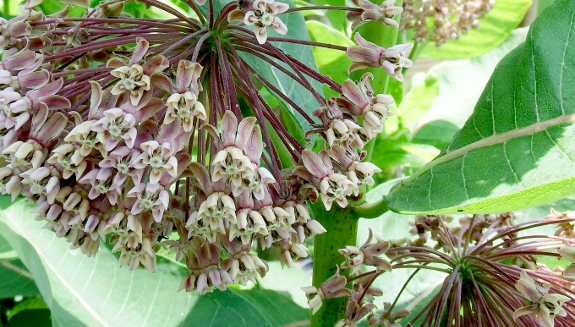
No caterpillars in sight.
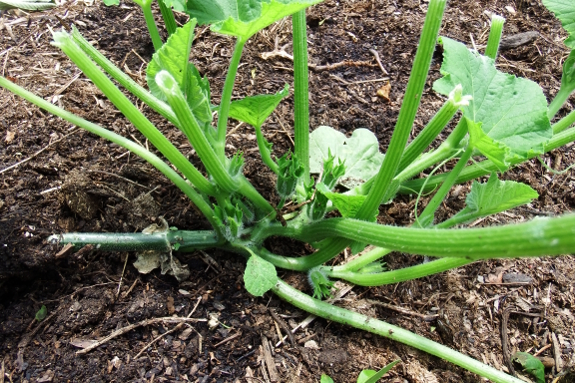
The deer have officially
won the war of the early summer garden. It pains me to admit defeat...but the
parts of the fencing delay that I could have changed (Mark enjoying six
weeks filming with graduate students, a trip of a lifetime to visit his
brother out West, Mom coming to visit our new digs, my writing taking
precedence over all else), I wouldn't change. And the parts we couldn't
change --- health problems, weather craziness --- well, we
obviously have to roll with all that.
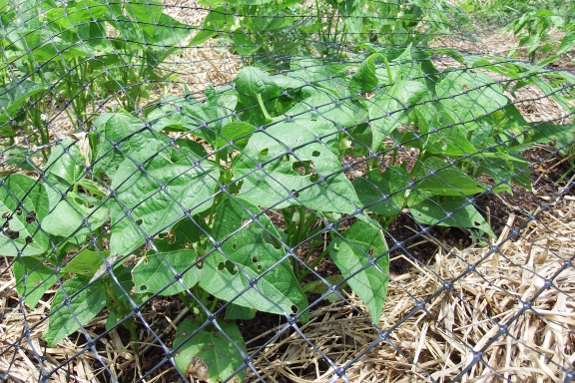
Which is not to say that
the garden was a complete loss. We ended up eating a lot of broccoli
and lettuce, a couple of cucumbers, a few handfuls of peas, and various
herbs. But all of the parts that are uncovered are now pretty much
kaput.
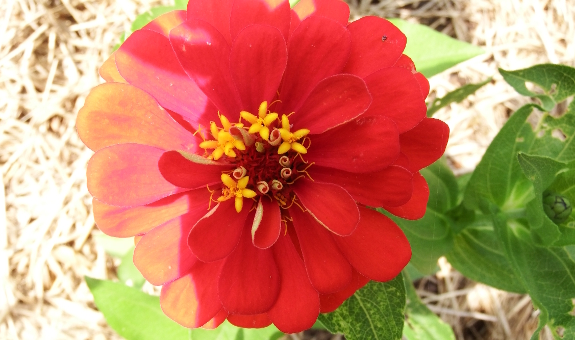
I'm disappointed,
obviously. But establishment years always have unexpected hurdles to
overcome. And our soil is clearly improving, as evidenced by the fact
that our plantings suddenly became tasty enough for the deer to eat as
soon as our topdressed manure began to sink in.
Meanwhile, I'm singing
the gardener's endless refrain: "There's always the next garden in the
fall." If I plant now in flats, maybe we will have managed to fence in
the garden when the time comes to set out....
We decided to use this
graduated 24 inch tall fencing for the bottom layer to keep rabbits
from jumping through the bigger holes near the top.
The new plan is to add a 4
foot fence on top of the graduated fence and use 2 foot chicken wire on
the very top 6 to 8 feet.
Cutting the job into smaller
chunks will cost a little more in material costs but make the
stretching of the fence easier on the two of us.
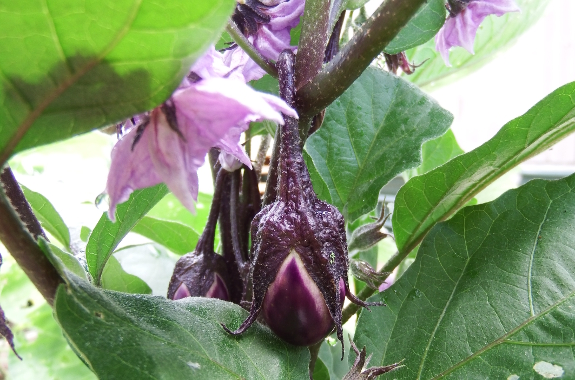
Despite my
doom-and-gloom post earlier, there are portions of the garden that
look surprisingly good. For example, my eggplants are doing
awesome...since they're still in pots right outside our back door.
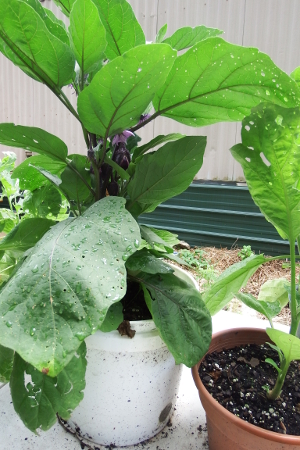 I'm currently growing two
varieties --- several Black Beauty that I started from seed and one
Patio Baby that came as a seedling from Rose Nell. The latter is
already blooming and setting fruit, possibly because I gave it a
two-gallon pot instead of a one-gallon but more likely because dwarves
tend to mature a little faster than full-size plants.
I'm currently growing two
varieties --- several Black Beauty that I started from seed and one
Patio Baby that came as a seedling from Rose Nell. The latter is
already blooming and setting fruit, possibly because I gave it a
two-gallon pot instead of a one-gallon but more likely because dwarves
tend to mature a little faster than full-size plants.
Earlier this week, I
braved deer-land and set two Black Beauties out in the garden so they
could spread out their roots. I placed one close to the trailer,
though, and the other under bird netting. If nothing else, our
eggplants should withstand the deer!
We installed an upper brace
post for the new garden gate.
Another ratchet helps to
tighten the brace.
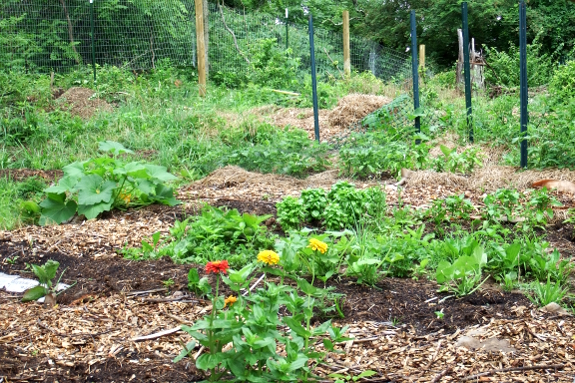
The fence is abruptly
almost done! I'll let Mark share more construction details with you
later. But for now, answers to the most important question --- what can
you plant in late June after the deer eat your original garden?
Fall crops should, of
course, be on the top of your agenda. I went ahead and sprouted some
peas (a bit early) and broccoli (a bit late), and will be
direct-seeding carrots and kale and lettuce at a later date.
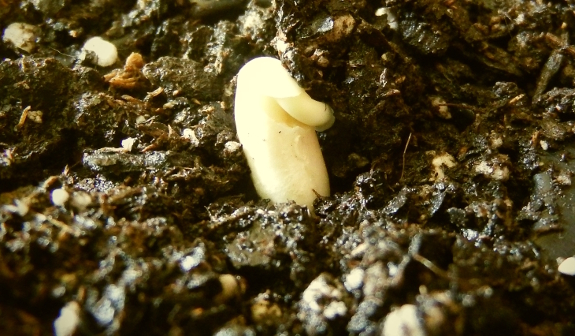
But I'm not really ready
to write off the summer garden, so I filled the rest of my flat up with
bush beans, summer squash, and cucumbers. I succession plant all three
of these anyway, so this actually isn't particularly late for a second
or third planting.
What else am I eying?
Strawberries! I've been itching to expand my patch, but was afraid to
risk this deer favorite outside a fence. Time to transplant some
runners and decide if I want to add a new variety to the patch.
Drilling the holes for the gate hinge was barely within the Dewalt's limits.
The next section of 4 foot fence had to be adjusted to match the incline of the hill.
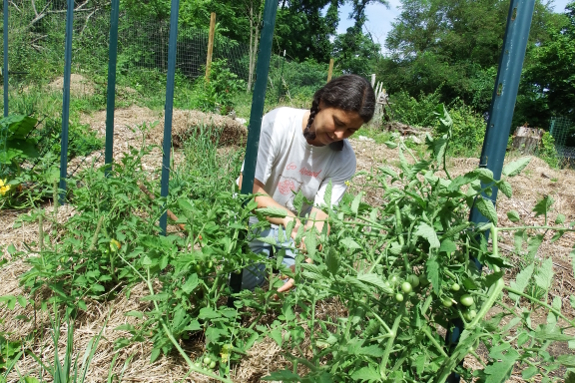
After the deer started
nibbling, I opted not to prune or train our tomatoes. After all, I
figured tying them up would just make the tender shoots easier to
reach, while pruning might be a problem if the deer came along behind
me and removed the stems I left behind.
But now we have a fence!
I'm a little afraid to trust the new barrier, but I went ahead and tied
up the tomatoes anyway. Given all of the rain we've enjoyed over the
last week, it's about time I got fungi-sensitive plants off the
ground...and in the process I noted the first hint of red on roma flesh.
I guess the summer
garden isn't a bust after all. I can just hear Mark now: "Ye of little
faith...."
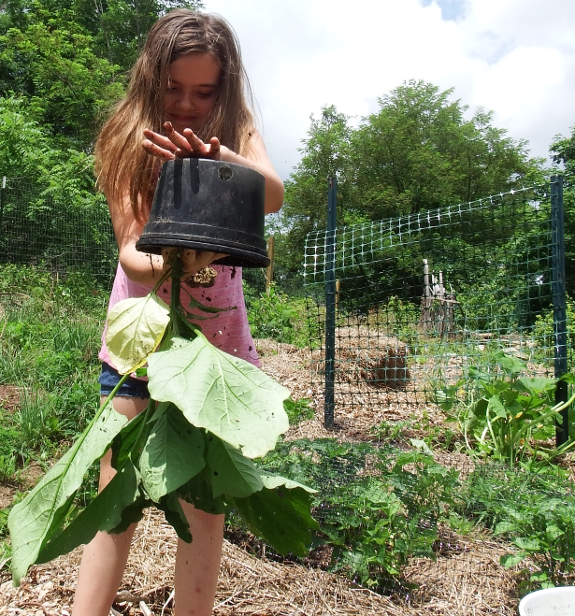
I had some assistance
with setting out the midsummer garden from one of our neighbors up the
street. She's willing to trade an hour under the hot June sun for an
hour in my well-stocked kitchen scratching her baking itch. Since said
neighbor leaves half of the chocolate cupcakes here for me and Mark to
snack on, I figure that's a win-win.
We used 16 gauge galvanized wire to stitch each section of our fence together.
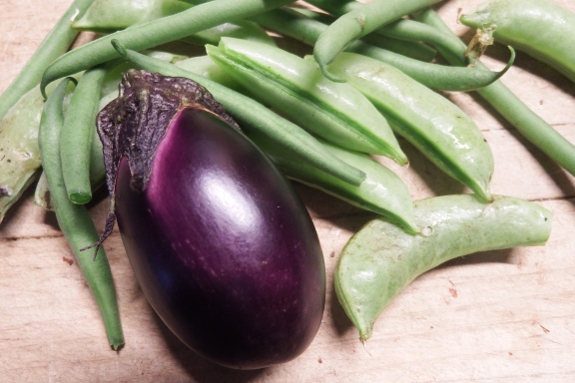
Eggplants come in
various shapes and sizes, and the purple ones are purple from the
start. All of those features make it tough to tell when a new-to-you
variety is ripe. Here are some hints I scrounged off the internet:
- Ripe eggplants have a very shiny skin.
- The eggplant itself should be firm but with some give to it.
- If you cut the eggplant open, the flesh should be white with (sometimes) a greenish tint. Seeds should be light yellow but not yet brown.
- Eggplants are best when eaten between 1/3 and 2/3 of their full
size. Younger, they may be bitter. Older, they're seedy and over-mature.
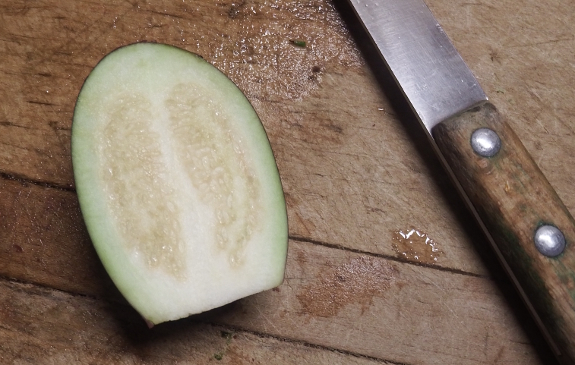
I went ahead and plucked
the largest fruit on our Patio Baby
since the plant was starting to be top heavy from all of those
developing eggplants. Based on the information above --- and the taste
when sauteed with the year's first green beans and (almost) the
spring's last sugar snap peas --- I'd say we chose the picking date a
hair early but not excessively so. It's looking like a good year for
eggplants!
Want more in-depth information? Browse through our books.
Or explore more posts by date or by subject.
About us: Anna Hess and Mark Hamilton spent over a decade living self-sufficiently in the mountains of Virginia before moving north to start over from scratch in the foothills of Ohio. They've experimented with permaculture, no-till gardening, trailersteading, home-based microbusinesses and much more, writing about their adventures in both blogs and books.
